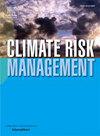Climate Ireland: A comprehensive evaluation of local authority climate action training
IF 5
2区 环境科学与生态学
Q1 ENVIRONMENTAL SCIENCES
引用次数: 0
Abstract
Governments in Europe must adjust to the changing climate, which necessitates building public sector capacity for climate action (European Commission, 2021). The Climate Ireland knowledge platform is a crucial national online resource providing climate data and information to decision-makers. Collaborating with Climate Action Regional Offices and the Local Authority Services National Training Group it delivered the “Raising Awareness” climate training programme which has been instrumental in increasing local government knowledge of climate change. The lack of consistency in training initiatives and the knowledge gap for decision-makers have been addressed in large part by Climate Ireland’s rise as a trustworthy training and information platform.
We analysed quantitative survey data from the Raising Awareness training programme, completed by 15,295 participants from local authorities across Ireland, using statistical methods to assess the training’s impact on participants’ understanding, knowledge acquisition, awareness, and decision-making abilities. The training programme was effective in increasing climate awareness, engaging with participants and improving knowledge acquisition. Strong correlations were also found between satisfaction, engagement and personal/professional relatability of the content. Most participants also reported increased feelings of confidence regarding the implementation of climate actions. Our findings suggest that engaging and personally relatable content leads to better satisfaction and learning outcomes. This study offers insights for shaping future climate action training that aligns with national and international commitments to train, empower and enhance capacity of decision-makers. It demonstrates the importance of ongoing training to build adaptive responses to climate change challenges, contributing to Ireland’s resilience and sustainability efforts.
爱尔兰气候:对地方当局气候行动培训的综合评估
欧洲各国政府必须适应不断变化的气候,这就需要建设公共部门的气候行动能力(欧盟委员会,2021年)。爱尔兰气候知识平台是一个重要的国家在线资源,为决策者提供气候数据和信息。它与气候行动区域办事处和地方当局服务国家培训小组合作,提供了“提高认识”气候培训方案,该方案有助于提高地方政府对气候变化的认识。培训计划缺乏一致性和决策者的知识差距在很大程度上已经通过气候爱尔兰作为一个值得信赖的培训和信息平台的崛起得到了解决。我们分析了来自提高意识培训计划的定量调查数据,该计划由来自爱尔兰各地地方当局的15,295名参与者完成,使用统计方法评估培训对参与者的理解、知识获取、意识和决策能力的影响。培训方案有效地提高了对气候的认识,促进了参与者的参与和知识的获取。满意度、参与度和内容的个人/专业相关性之间也存在很强的相关性。大多数与会者还报告说,他们对实施气候行动的信心有所增强。我们的研究结果表明,引人入胜和个人相关的内容会带来更好的满意度和学习成果。这项研究为塑造未来的气候行动培训提供了见解,这些培训与国家和国际对培训、赋权和提高决策者能力的承诺相一致。它展示了持续培训的重要性,以建立适应气候变化挑战的反应,有助于爱尔兰的复原力和可持续性努力。
本文章由计算机程序翻译,如有差异,请以英文原文为准。
求助全文
约1分钟内获得全文
求助全文
来源期刊

Climate Risk Management
Earth and Planetary Sciences-Atmospheric Science
CiteScore
8.20
自引率
4.50%
发文量
76
审稿时长
30 weeks
期刊介绍:
Climate Risk Management publishes original scientific contributions, state-of-the-art reviews and reports of practical experience on the use of knowledge and information regarding the consequences of climate variability and climate change in decision and policy making on climate change responses from the near- to long-term.
The concept of climate risk management refers to activities and methods that are used by individuals, organizations, and institutions to facilitate climate-resilient decision-making. Its objective is to promote sustainable development by maximizing the beneficial impacts of climate change responses and minimizing negative impacts across the full spectrum of geographies and sectors that are potentially affected by the changing climate.
 求助内容:
求助内容: 应助结果提醒方式:
应助结果提醒方式:


